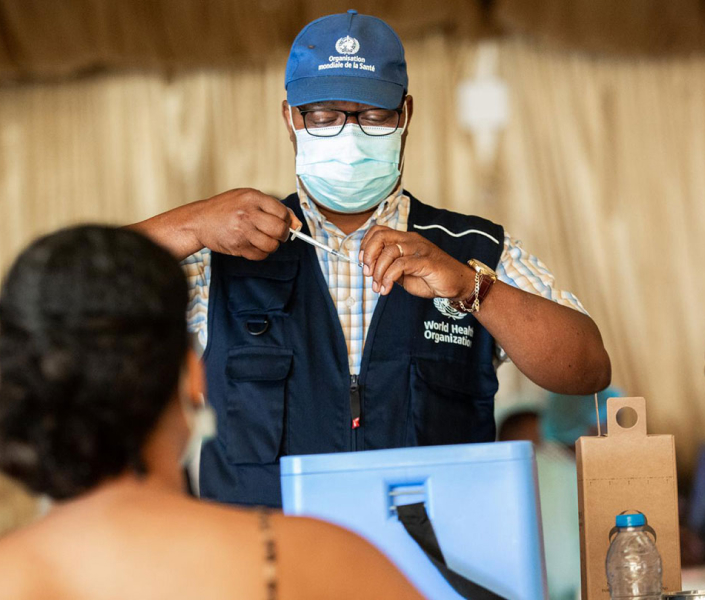Progress report African region 21 - 2.2. Deploying resources responsibly and strategically

Resource mobilization focused during the last six months on securing funds for oxygen production and equipment procurement, distribution and maintenance, vaccination procurement, preparedness and roll-out, improved case management and critical care capacities, expanded PCR and antigen testing, surveillance, community engagement, research and innovation, and information management. As this report goes to press, there has been an overwhelming surge in response to Africa’s appeal for the equitable global distribution of vaccines, and several major donors have promised to match Africa’s needs. But while vaccines supplies have been secured, covering the cost of undertaking the vaccination roll-out, estimated at US$ 5.00 for every US$ 1.00 spent on a vaccine dose remains a challenge.
Income and expenditure
To allow WHO to build on gains from 2020 and continue supporting countries to combat the COVID-19 pandemic, a total of US$ 525.4 million was proposed as the estimated required total for the implementation of the WHO African Region SPRP 2021. This is in addition to Member State bids for national action plans and strategic preparedness and response plans. As of the end of July 2021, the total funding committed to the 2021 SPRP was US$ 155.2 million. This represents 27% of all the grants received, of which 94% is earmarked. A 70% funding gap remains.
“As the world continues to deal with the COVID-19 pandemic and its aftermath, WHO’s role in the coordination and provision of technical expertise continues to be crucial, in view of sharing information and ensuring an efficient response. DG ECHO remains committed to supporting WHO in its efforts to deliver assistance to the most vulnerable, faced with the COVID-19 pandemic on top of existing humanitarian crises. In 2020, out of the total of €70.S million allocated to WHO, €8.35 million was allocated to African countries and €30 million specifically for preventing, containing and mitigating the spread of COVID-19 in fragile States in Asia and Africa. In 2021, until July, DG ECHO has allocated € 7.7 million to WHO, for projects in African countries.”
Since the onset of the pandemic, a total of US$ 479.3 million has been committed – US$ 11.5 million in pledges and US$ 143.7 million received in 2021 – for the COVID-19 response in the WHO African Region. As of 31 July 2021, a total spending rate of 74% had been realized. The target areas of intervention and implementation aligned with the funds earmarking is as follows:
As the pandemic lifespan stretched, funding and implementing partners understood the need to increase country capacities in resource mobilization, and to introduce greater flexibility in funding cycles towards strategic positioning of resources. In effect, while the quick turnaround for COVID-19 resource mobilization had initially been appropriate, during this second year of the pandemic, WHO-AFR provided guidance for countries to request the right funding, for the right programme. This was especially true given the rapidly changing epidemiological situation, which required greater flexibility from funding bodies in addition to strong accountability mechanisms.
For example, WHO-AFR worked with countries to support applications to a US$ 7.5 billion COVID-19 dedicated portfolio created by the Global Fund to fight HIV/AIDS, Malaria, and Tuberculosis. To this end, the Brazzaville team, with colleagues in 47 country offices and the subregional hubs in Dakar, Libreville, Harare, Nairobi and Ouagadougou, conducted broadscale (trainings, guidance) and tailored (individual outreach, application review, funding) interventions for government partners. WHO-AFR worked with the Global Fund to adapt programmatic criteria, within widened funding submission windows. The strong coordination during the past semester between WHO-AFR and Global Fund led to more robust submissions surrounding surveillance; national testing strategies; end-to-end supply systems; and health systems strengthening, some of which had been absent, underrepresented, or not aligned with WHO guidance.
Notwithstanding challenges, across Africa, countries activated resources in a relatively similar manner, with considerable focus on enhancing testing capacities for critical care and for social behaviour change communication. Spending capacity was directly proportional to the availability of goods and services, that is, difficult access to reliable oxygen supplies or unavailability of qualified personnel, limited background infrastructure as a base for the installation of COVID-19 treatment centres, among so many others. WHO is grateful to, and acknowledges partners and contributors for their continued support. We are committed to making sure our income is used efficiently, effectively, and responsibly, making every cent count.
“The COVID-19 pandemic is a threat to everyone. Since the onset of the pandemic, the Deutsche Gesellschaft für Internationale Zusammenarbeit (GIZ) strongly engaged in response and preparedness measures across the African continent and beyond. To provide essential pandemic response services to the Tanzanian people, GIZ partnered with WHO as a strong, reliable and knowledgeable organisation. GIZ is looking forward to further supporting the Tanzanian government together with WHO and other development partners to provide coordinated and effective response as the COVID-19 pandemic and its aftermath can only be overcome with globally Joined forces.”




